Entry 1 of the Taiwan trip: Culture shock. |
 great divide about 3 hours
after takeoff. As I look down at this great monument to water flow, I think about the
Donner party, Lewis & Clark (the guys, not the office). The real import of their deeds
mostly escapes me as I roar over the crags at 40,000 feet, fortified with a smuggled
brandy in one hand and a copy of Walden Pond in the other.
great divide about 3 hours
after takeoff. As I look down at this great monument to water flow, I think about the
Donner party, Lewis & Clark (the guys, not the office). The real import of their deeds
mostly escapes me as I roar over the crags at 40,000 feet, fortified with a smuggled
brandy in one hand and a copy of Walden Pond in the other.
I have a 2-hour layover in LA, and then head for the China Air gate. There should be a sign there saying "Culture shock begins here." All the airline personnel are as crisply turned out as soldiers, and smiles are ubiquitous. The flight being 1/2 full, everyone grabbed 3-4 seats to sleep across on the 14-hour flight. After boarding, it was less than 5 minutes 'til the engines started. Before the plane moved, the stewardesses came down the aisle with steaming towels for everyone. Maybe it was a refreshment - maybe a ritual cleansing before leaving. Either way, everyone soothed their face and neck with smiles of satisfaction as we taxied to the runway. After a (for me) white-knuckled takeoff, everyone gets slippers, blankies, and pillows. "Please fill in your menu choice, Sir. Dinner in 1 hour."
Excellent dinner: fish and noodles followed by fresh fruit, Drambui, and the last good coffee I'll probably see before Starbuck's in Hong Kong. Now I travel budget class, and the amenities on China Air are excellent by any standard. This being so, I can hardly imagine the atmosphere in first class; I think of a hushed atmosphere on oriental carpets - the ring of crystal - the fizz of champagne. The senses reel at the thought of such a Bacchanal. Considering how close the 1st class section and these temptations are to the cockpit and pilots, I don't look in there - there are some things that even the most inquisitive shouldn't know.
Flying the great-circle route from LA to Taipei takes one near the Aleutian islands of Alaska and over Tokyo in a great arc that cheats the earth's circumference of its due in a triumph of technology over geography. Sometimes technology is good. There is a TV screen that keeps the passengers abreast of events. We are just south of Fairbanks, flying at 39,000 ft., and at 570 miles per hour. The outside temperature is 61 degrees below zero. Somehow the fact that there is a life preserver under the seat becomes less comforting.
Gliding along in an insulated cocoon about 7 miles up is a little disconcerting, but things get better. The area around me is filled with young Buddhist acolytes in robes. They say they are from a temple in LA, and are going to Kaoshung Taiwan, their home, for a 2-week visit. So here I am, a meat and taters kinda guy, flying high enough up that I can see the earth's curvature, surrounded by a buncha monks, watching a Robin Williams video, and taking notes. This surrealism reminds me of Hunter Thompson when he said, " and through it all and all my travels - it never got weird enough for me." I stand on tall shoulders, but this is weird - even for me.
Things went a little sour about at the international date line. We hit some turbulence, and then we really hit some turbulence. Several drinks became fashion accessories and the rest hit the fan. The shaking of the plane was incredible, and when I thought of what it would take to rattle a million-pound aircraft, I tried to think about something else - tough job. A quick look around showed 6 monks praying and 6 sleeping. So much for any divine inspiration about potential air crashes; bad predictive validity, one might say.
The flight is a little like a hospital now. All of the greenish people can't get to sleep because of the plethora of well-intentioned staff that want to do them some good.. Another 6 hours, another round of hot towels, a noodle call with more brandy, and a view of Tokyo that won't be forgotten soon leaves us at Chaing Ki Shek International Airport. The first sign I see says "Trafficking in drugs or guns is a capital offence in The Republic of China. It is punishable by death. I would have thought some kind of friendly welcome appropriate. They take things pretty seriously here, if you ask me. At customs, the stern-faced official asks if I have anything to declare. When I hand him my passport, he looks at the green US book and inquires about any drugs or guns I might have (after all, we all know about Americans and guns). I say that I have none, even though he gives me the impression that it would go easier on me to confess now. He hands back my green book, smiles, and says "Have a nice stay in Taiwan, Sir." I could have hauled a heroin-stuffed bazooka ashore in my unopened bag.
Took a bus for the 45-minute ride to Taipei. A deadly trip on an Interstate-like highway. I have now had my daily limit of near-death experiences. Went to the YMCA, where we were welcomed with open arms, and a bill for $52US for one night. When I got to the room, I started to unpack. After just having walked 5 blocks from the bus to the Y, I knew that I had too much crap along. I tried to pack what I would need for a 100-day+ trip to China; I had computer, camera, coffee, clothes, etc.. When the bag was empty, I discovered that I had packed not a single pair of underwear. I really look forward to finding some shorts in a place where English speakers are rare, the people diminutive, and I need shorts that are measured by the hectare. Even planning the sign language that would serve this task without getting me jail time didn't stop me from sleeping about 10 hours straight though.
The next day, I quickly discovered that the Taiwanese hate me. The previous-night's bus driver tried to kill us in a pretty impersonal kinda way - just doin' his job, after all - but whenever I cross any street here, the motor scooters, cars, and busses try their damnedest to finish the job. My friend, Bob, says to cross with the school children so we can have a human shield. Not many school kids out at 11 PM.
Entry 2 of the Taiwan trip. 6000 years of written history, art and culture. |
When Chiang Kai Shek set about his business, he ran into the legions of peasant warriors led by Mao. Mao's troops worked in the fields with the people, lived amongst them, and won their hearts and minds (sorry, LBJ). When Chiang found that most of the country was pretty mad at him, he back-pedaled like an engineer at a pending train wreck. As he was driven out of the country to Formosa/Taiwan, he captured many chests of treasure from Peking and the forbidden city and took 'em along. Sounds like a 12th century fairy tale rather than something that happened 50 years ago. The chests, and their contents, are in the palace museum in Taipei.
This museum is really big - mind-bogglingly big. About as big as the main campus at MU, including all its buildings. Here are the great works of China's artists and craftsmen going back several thousand years: Calligraphy and writing from long before Christ, carved jade from 1000 BC; all in buildings surrounded by lakes and gardens.
The most fascinating part for me was the miniature carvings exhibit. One ivory carving was of a temple. Inside, there were people praying - all detailed to the eyelash level. The embroidery on their clothes was minutely detailed. The whole carving was the size of a pack of cigarettes. Another really sharp-eyed fellow, commissioned by the emperor, carved a 3-D boat with people dining inside. The plates and, yes, even chopsticks were detailed to apparently sub-atomic levels; the filigree on the chopsticks could be seen through a magnifying glass; this all carved from an olive pit 1 inch long. These emperors must have had a good grip on the hearts and minds of the people too - or some part of their anatomy. Bob figures when the big guy said "AMUSE US," everyone grabbed an oar and stroked. The olive pit was 13 years in the making - to call it incredible is as inadequate as calling the grand canyon a ditch.
We met up with several friends of Bob's here that he had met in the states. They were mostly students from William Woods College that had rented apartments from him in Columbia. These people are unrelenting in their drive to not let you spend a nickel (dollar here, at 32NT:1US). We have been wined and dined to the human capacity for such and, believe me, there is such a limit - even among the most hedonistic. Our hosts, Frank and Jasmine, sort of gang up on you - 'good-cop/bad-cop' kind of hosts. I keep insisting that I will pay for the lavish and expensive dinners we regularly eat. Frank says no that is impossible while Jasmine looks sad and says how embarrassed they will be if I do; they make you want to kick yourself for entertaining such an idea. Now, these guys are not down-and-out by any means; they have good jobs, nice apartments, and nice clothes (as best I can tell, we all know my taste in clothes). Still, I had to draw the line when, as I was looking at a thermos for tea water in the store window, Frank said "here, I will buy it for you." It almost took a violent act to convince him I was, by God, payin' for my own thermos. After Jasmine's response, we felt so bad that we later let Frank convince us to stay at his house for the remainder of the stay in Taiwan.
Every street, every sidewalk, every building constantly writhes with movement like a basket of squirming puppies. To make sense of it you have to focus on an individual, like a ballerina in a spin focuses on a spot at each revolution, or you get dizzy. Bob says the scenery constantly changes - yet never does.
Entry 3 of the Taiwan trip: Get around, get around, I get around - and around and around......... |
Despite the rich history
and culture of the Chinese, they have failed to 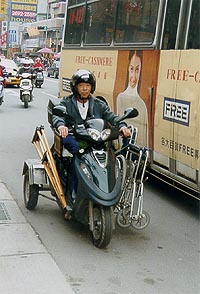 rationalize traffic laws to any great extent. I can
say without exaggeration that transportation here consists of seemingly random acts of
violence. Believe me, the #236 city bus is the "E" ticket in town - Disney's got
nothing on these guys. The streets here are either so small that a scooter has to wriggle,
or 12 lanes wide. The vehicles range from bicycles to semi trucks. Every other car is a
yellow taxi. Traffic lights mean little, and all the vehicles have 2 speeds - go like hell
or stopped with an apparently fatalistic driver I imagine to be fuming inscrutably and
waiting for the next chance to do murder. I have seen a little scooter with mom, pop, 2
children and a large television weave in between mammoth busses with less than 5 inches of
total clearance. Some things are so foreign they can't be explained - ever.
rationalize traffic laws to any great extent. I can
say without exaggeration that transportation here consists of seemingly random acts of
violence. Believe me, the #236 city bus is the "E" ticket in town - Disney's got
nothing on these guys. The streets here are either so small that a scooter has to wriggle,
or 12 lanes wide. The vehicles range from bicycles to semi trucks. Every other car is a
yellow taxi. Traffic lights mean little, and all the vehicles have 2 speeds - go like hell
or stopped with an apparently fatalistic driver I imagine to be fuming inscrutably and
waiting for the next chance to do murder. I have seen a little scooter with mom, pop, 2
children and a large television weave in between mammoth busses with less than 5 inches of
total clearance. Some things are so foreign they can't be explained - ever.
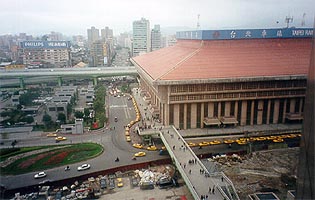 the above. This is OK for those
little forays to eat because almost any restaurant will do, but some trips have greater
consequences; when I leave my baggage at a friends, for instance.. If I were to lose their
number and address (in Chinese), I might never be able to contact them again. No English
here; I speak no Chinese; I feel too old for this nowadays.
As we barrel through the
maze they call streets, I ask Frank which parts of the city I need to be extra careful in.
He says that there are no such places and that I can walk safely in all parts of the city
- regardless of the time. There are millions here - maybe Chicago-sized. I can't even
imagine this lack of crime being the case in, say, any American city. How can such a
society not have safe-appearing transportation? I guess everyone bent on doing murder
becomes a bus driver for cathartic purposes.
the above. This is OK for those
little forays to eat because almost any restaurant will do, but some trips have greater
consequences; when I leave my baggage at a friends, for instance.. If I were to lose their
number and address (in Chinese), I might never be able to contact them again. No English
here; I speak no Chinese; I feel too old for this nowadays.
As we barrel through the
maze they call streets, I ask Frank which parts of the city I need to be extra careful in.
He says that there are no such places and that I can walk safely in all parts of the city
- regardless of the time. There are millions here - maybe Chicago-sized. I can't even
imagine this lack of crime being the case in, say, any American city. How can such a
society not have safe-appearing transportation? I guess everyone bent on doing murder
becomes a bus driver for cathartic purposes.
Entry 4 of the Taiwan trip: "Eat all your food. There are children starving in America." |
Everyone likes to eat -
everywhere. But the Chinese really like to eat.  It is an inextricable part of
their social life. No street or block is without a stand selling some kind of food ranging
from cotton candy to octopus jerky. The traditional markets consist of streets lined on
both sides with sellers of literally every type of food; they are
It is an inextricable part of
their social life. No street or block is without a stand selling some kind of food ranging
from cotton candy to octopus jerky. The traditional markets consist of streets lined on
both sides with sellers of literally every type of food; they are  generally open
until around noon. All the produce and meats are fresher than in the states. The seafood
stalls don't smell at all - the sign of freshness. The bakeries and pastry shops
are well stocked. I have seen no Taiwanese that appear malnourished, with one exception
mentioned later - so much for the "fish heads and rice" myth that floats across
the West from time to time.
generally open
until around noon. All the produce and meats are fresher than in the states. The seafood
stalls don't smell at all - the sign of freshness. The bakeries and pastry shops
are well stocked. I have seen no Taiwanese that appear malnourished, with one exception
mentioned later - so much for the "fish heads and rice" myth that floats across
the West from time to time.
They have what are called
night markets in Taiwan. These are like the  traditional markets in that they line certain streets, but these
markets cater more to people looking for supper or commercial goods, rather than
foodstuffs. About every 20 feet there is a stall or storefront selling some kind of food:
traditional markets in that they line certain streets, but these
markets cater more to people looking for supper or commercial goods, rather than
foodstuffs. About every 20 feet there is a stall or storefront selling some kind of food: 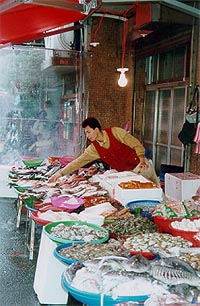 dumplings, noodles, soup, pastries, and more. Frank tells me that many people do not cook
at home, preferring to eat cheaply on fresh-cooked food from the stalls and markets. I see
several women getting a variety of hot foods to-go for their families. An average meal in
the stalls costs about $1.25.
dumplings, noodles, soup, pastries, and more. Frank tells me that many people do not cook
at home, preferring to eat cheaply on fresh-cooked food from the stalls and markets. I see
several women getting a variety of hot foods to-go for their families. An average meal in
the stalls costs about $1.25.
There are few homeless
here in Taipei; I have seen only 2-3 since arriving. I ask Frank if there are more or
fewer poor now than 10 years ago. He says much fewer now because of the economy. All
Taiwanese citizens have medical coverage. I tell Frank that maybe the problem will become
worse as Taiwan continues to be integrated into the world market and privatize more
services, just as it has in other countries - the US and Japan, for example. He says the
poor are such because they have no children or none that will care for them. CNN Asia has
a report tonight that The People's Republic is facing record unemployment at 5%,
there is labor unrest in South Korea, and economically caused rioting in  Indonesia. How to explain Woody Guthrie and the Union Maid to my Chinese
friends escapes me.
Indonesia. How to explain Woody Guthrie and the Union Maid to my Chinese
friends escapes me.
We went riding in the
mountains over- looking Taipei for a day. The scenery and weather were beautiful. Along
the way, small driveways led up or down from the road. Frank told me these were to the
homes of 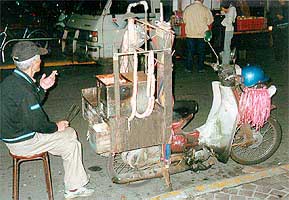 wealthy and powerful men. Sure enough, near the top there are
several unsmiling men in uniform blocking traffic as a limo with general's stars exits a
discreet driveway. The rich always have a way to look down on the poor. Frank says that
when the typhoons come, sometimes these mountain-side houses are washed downhill in
mudslides. This could be social justice at work, except when one considers who lives at
the bottom where they land.
wealthy and powerful men. Sure enough, near the top there are
several unsmiling men in uniform blocking traffic as a limo with general's stars exits a
discreet driveway. The rich always have a way to look down on the poor. Frank says that
when the typhoons come, sometimes these mountain-side houses are washed downhill in
mudslides. This could be social justice at work, except when one considers who lives at
the bottom where they land.
Entry 5 of the Taiwan trip: Style, fashion, and life at the cellular level. |
In cosmopolitan Taipei, as in many other cities, women and youth are particularly fashion conscious. I imagine that if a woman in Milan were to tie tin cans to her clothes as a fashion accent, we would hear clattering noises in Taipei within minutes. The latest fashions here are platform shoes and mini-skirts, giving credence to the adage about keeping old fashions 'cause they're sure to come back in vogue later; I thought these were old hat in the seventies.
Some Chinese women and
girls have this Western body-image fascination that leaves them in an emaciated state.
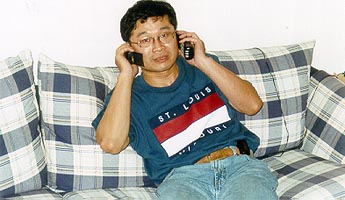 Many have legs smaller than my arms. This type of thinness can only be purposeful and the
end result is less than beauty. Under-nourished skin requiring much makeup is common and I
am sure that this phenomena cannot be healthy for growing girls. I have read that
reproductive and other health problems are associated with this illness as well. These are
the only underfed people I have seen in Taiwan.
Many have legs smaller than my arms. This type of thinness can only be purposeful and the
end result is less than beauty. Under-nourished skin requiring much makeup is common and I
am sure that this phenomena cannot be healthy for growing girls. I have read that
reproductive and other health problems are associated with this illness as well. These are
the only underfed people I have seen in Taiwan.
The most common thing heard among people in Taipei's public places is "Wei" - Chinese for hello. People on scooters, in busses and on trains, in elevators, and at the table are equipped for life at the cellular level. Now that cell phones are as small as a pack of cigarettes, they are worn almost as a fashion accessory by the trendy and business oriented. Many stores sell nothing but accessories for cell phones: carry cases, belt clips, straps, and pouches. One inventive marketer designed a 6-inch high wooden chair just to put on your coffee table for holding your cell phone when you're home. I told Frank he should also have a little bed to set on the nightstand for the phone to rest when he does; he said that would be really cool. Some of the things that don't translate well are irony, humor, and satire.
Entry 6 of the Taiwan trip: My hosts. |
My hosts while in Taiwan
were extremely gracious and immensely helpful. Frank, Michelle, Jasmine, Tom,
Frannie,
Erin, Fu 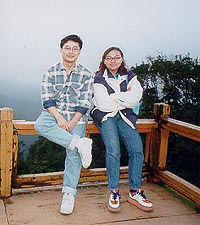 Huo,
and many others spent many hours ensuring that I see as much of Taiwan as possible; they
succeeded, and I would like to thank all of them for their efforts in making this the best
vacation I have had. In particular, I would like to thank Frank Lo for allowing me the
extra room at his apartment. The location and convenience allowed me to roam at-will in
their great city. Thanks again to all of you. I will have to host many Chinese people to
get even.
Huo,
and many others spent many hours ensuring that I see as much of Taiwan as possible; they
succeeded, and I would like to thank all of them for their efforts in making this the best
vacation I have had. In particular, I would like to thank Frank Lo for allowing me the
extra room at his apartment. The location and convenience allowed me to roam at-will in
their great city. Thanks again to all of you. I will have to host many Chinese people to
get even.